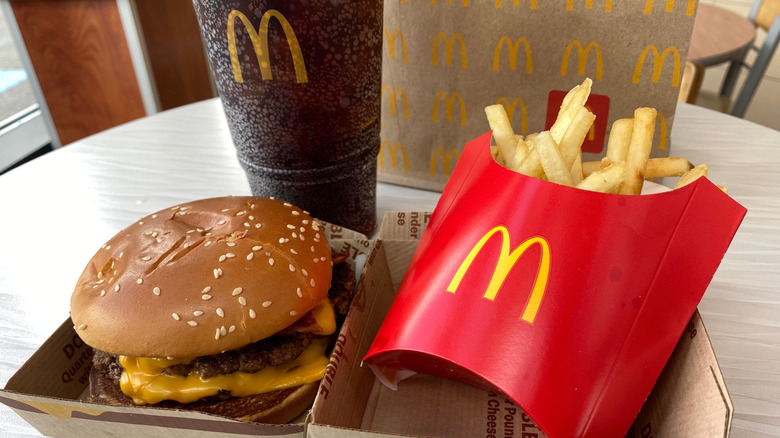McDonald's Quarter Pounder Linked To Multistate E. Coli Outbreak
The Centers for Disease Control and Prevention (CDC) has confirmed reports and issued a warning about a multistate outbreak of E. coli O157:H7, with infections being linked to McDonald's Quarter Pounder burger varieties. Although reports have not specified which ingredient the E. coli outbreak is linked to, most people reporting the outbreak described eating a McDonald's Quarter Pounder burger before falling sick.
Preliminary information reviewed by the Food and Drug Administration (FDA) suggests that the outbreak may be linked to the slivered onions or beef patties on Quarter Pounder burgers. As a precaution, McDonald's is proactively stopping the use of its fresh slivered onions and quarter pound beef patties in the several states where outbreaks have occurred and halting the sale of Quarter Pounders entirely in other states.
Here are the states that are impacted and symptoms to look out for
So far, 49 people have been impacted by the outbreak from McDonald's Quarter Pounders in states including Colorado, Nebraska, Utah, Wyoming, Oregon, Montana, Kansas, Missouri, Iowa, and Wisconsin, with the majority of cases falling in Colorado and Nebraska. At this time, 10 people have been admitted to the hospital and one person has died from the outbreak. The Food Safety and Inspection Service (FSIS) is working to conduct a traceback of the hamburgers served at McDonald's in the affected states to figure out if the ground beef or the slivered onions are the source for the outbreak.
According to the CDC, most people infected with E. coli suffer fever, stomach cramps, vomiting, and diarrhea containing blood. Symptoms can start three to four days after consuming a contaminated product, and most people will recover without treatment after five to seven uncomfortable days. If severe enough, the illness can require hospitalization. Other signs of E. coli include severe dehydration and an intense feeling of dizziness. If you consumed a McDonald's Quarter Pounder burger and believe you have symptoms of E. coli, the CDC recommends that you contact your health provider and seek necessary medical attention.

